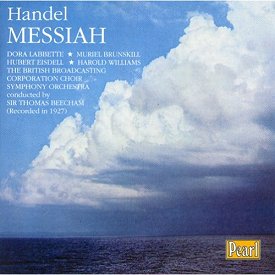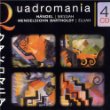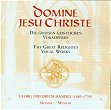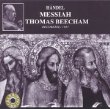
|
SITE RATING: 5/10 SITE
REVIEW: Listening to a
recordings like Sir Thomas Beecham's 1927
recording of Messiah takes some
education, otherwise, the casual listener
would quickly listen to a few seconds, and
then simply turn it off, our modern ears not
accustomed to the particular idiosyncracies
that 1927 listeners were accustomed to.
In particular, singers from this era did
little recording - most of their livelihood
was made on stage, or in drawing rooms of
wealthy patrons. They learned their
craft in opera houses and theaters, and the
way their voices were trained for those venues
was quite different from today, where
artificial amplification and other in-studio
means could polish off the worst vocal
offenses. Which means that all of the soloists
use trills and vocal scoops which our modern
ears are not accustomed to; and their voices
have tonal colors and shades that are quite
different from modern vocal techniques.
Also, recording technology was still very
primitive, and much depended on the placement
of the orchestra and singers in relation to
the microphone. Historically, this is an
extraordinarily important recording, being the
only full reading of the score to survive.
Pearl Records, which makes its specialty
in rescuing and restoring early Twentieth
Century albums, has done everyone a great
service by searching for these archival
recordings and putting them out to the public,
where otherwise they might simply lay ignored
in library special collections. The only
other project like it on CD is Koch Historic's
double-disc collection of Messiah
fragments, dating from 1898-1930.
Besides the vocal variances, the
recording was obviously mastered from
pre-vinyl sources, and carries the burden of
ever-present surface noise. ~ BDW
|




